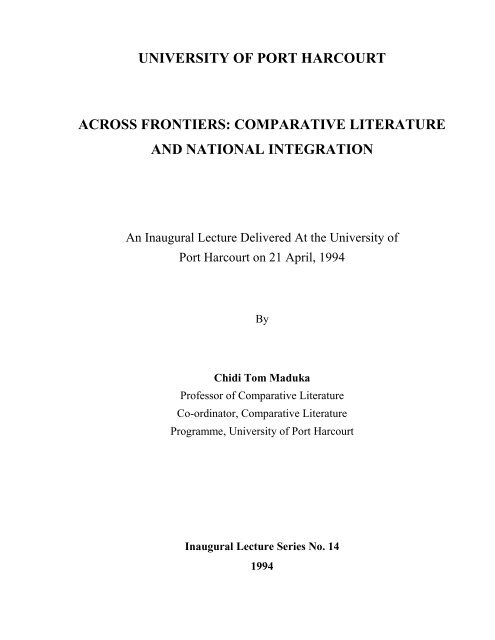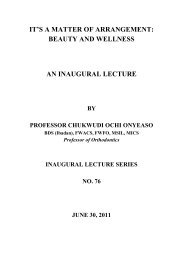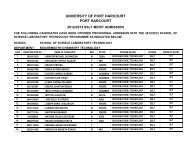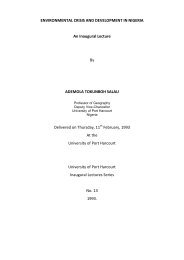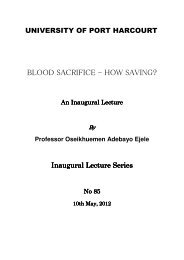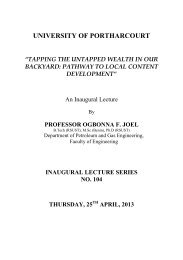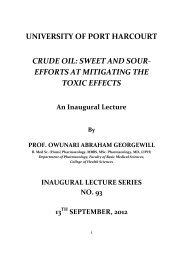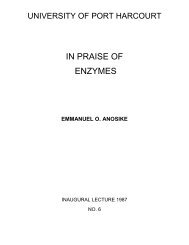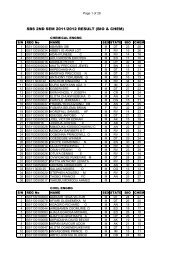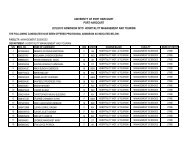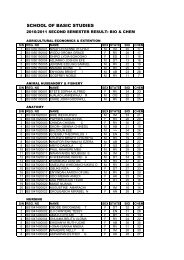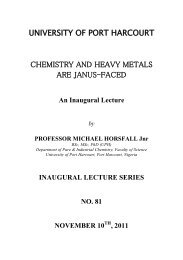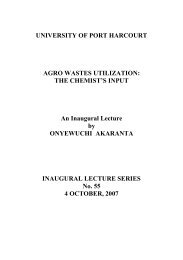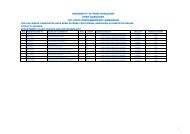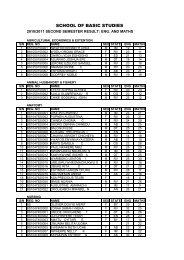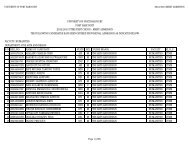14th Inaugural Lecture - 1994 by Prof. Chidi Tom Maduka
14th Inaugural Lecture - 1994 by Prof. Chidi Tom Maduka
14th Inaugural Lecture - 1994 by Prof. Chidi Tom Maduka
Create successful ePaper yourself
Turn your PDF publications into a flip-book with our unique Google optimized e-Paper software.
UNIVERSITY OF PORT HARCOURT<br />
ACROSS FRONTIERS: COMPARATIVE LITERATURE<br />
AND NATIONAL INTEGRATION<br />
An <strong>Inaugural</strong> <strong>Lecture</strong> Delivered At the University of<br />
Port Harcourt on 21 April, <strong>1994</strong><br />
By<br />
<strong>Chidi</strong> <strong>Tom</strong> <strong>Maduka</strong><br />
<strong>Prof</strong>essor of Comparative Literature<br />
Co-ordinator, Comparative Literature<br />
Programme, University of Port Harcourt<br />
<strong>Inaugural</strong> <strong>Lecture</strong> Series No. 14<br />
<strong>1994</strong>
DEDICATION<br />
To all the protagonist of inter-ethnic harmony<br />
pitched against a small clique of ambitious and<br />
egomaniacal damages despicably exploiting<br />
ethnic loyalties for their ignoble, selfish and<br />
avaricious end.<br />
<strong>Chidi</strong> <strong>Tom</strong> <strong>Maduka</strong>
Across Fronties: Comparative Literature and<br />
National Integration<br />
Kùkùkù Kùkù<br />
KùkùKù kùkù<br />
KùkùKùkù Kùkù<br />
KùkùKùkù Kùkù<br />
(The song of a bird passing judgment on<br />
human behaviour)<br />
(Human beings are crazy<br />
Human beings are crazy<br />
Where do they see boundaries<br />
Where do they see boundaries)<br />
Mr. Vice-Chancellor, Sir, I would like to pay homage to the big masquerades of my<br />
clan which have performed here on the village square. We all vividly remember the first<br />
one that opened the festivity of inaugural lectures at the University of Port Harcourt. It<br />
had two intriguing faces- one in front and the other at the back. The dance steps so<br />
mesmerized the spectators that no one could precisely say which side of the masquerade<br />
was the front. That was the History-Masquerade which had <strong>Prof</strong>essor E. J. Alagoa as<br />
the chief attendant. Its movements, we have been told, were dictated <strong>by</strong> the nature of the<br />
discipline which probes into the past in order to illuminate the present and suggest<br />
pathways for the future. The topic was “The Python’s Eye: The Past in the Living<br />
Present”.<br />
Two other masquerades then followed, each one magnificent in its shape and striking in<br />
its decorations. Who does not recall the weird but captivating look of their mouths and<br />
ears The vibrations from the two parts of the body emitted sounds that were at once<br />
mellifluous and cacophonous. These were the Linguistics-Masquerades which had<br />
<strong>Prof</strong>essor Kay Williamson and E. Nnanolue Emenanjo as their chief attendants. The<br />
shapes of the masquerades reminded the spectators that in Linguistics it is necessary to
have a hyper-sensitive tongue and very keen ears to be able to distinctly hear, repeat and<br />
analyse the sounds of the various languages of the world. <strong>Prof</strong>essor Williamson’s<br />
performance centred on “The Pedigree of Nations: Historical linguistics in Nigeria”<br />
while that of <strong>Prof</strong>essor Emenanjo was on “Linguistics, Language and the Nation”. Mr.<br />
Vice Chancellor, Sir, before I mention the last two masquerades, I crave your<br />
indulgence to make a point that even male chauvinists conceded was commendable: in<br />
performances of this historical magnitude, gender politics ceases to be of any<br />
significance – any person, man or woman who, as our elders say, successfully climbs<br />
the iroko tree and fetches firewood from it, automatically plays the chief attendant of a<br />
masquerade performance. No person was surprised to see <strong>Prof</strong>essor Williamson playing<br />
such a role: in fact, she so dazzled the audience with her intellectual acrobatics that she<br />
succeeded in putting a nail on the coffin of any form of discrimination in life.<br />
The last two masquerades testify to the richness and complexity of this form of cultural<br />
performance from any clan, the Faculty of Humanities. All of us still marvel at the<br />
dexterous movements of the two masquerades whose body decorations were exquisitely<br />
embroidered to evoke feminine elegance. Light- footed, the masquerades used their<br />
dance steps to make curves of various shapes: squares, circles and triangles – all so<br />
aesthetically accomplished that the spectators felt bewitched <strong>by</strong> the spectacle. These<br />
were the Literature-Masquerades whose performances were directed <strong>by</strong> <strong>Prof</strong>essor<br />
Charles Ekwusiaga Nnolim and Ola Rotimi. Even the scientists in the audience noticed<br />
with alacrity that the displays quintessentially dramatized the nature of literature which<br />
revels in acrobatic maneuvers with words <strong>by</strong> quarrying the musical and metaphorical<br />
overtones of language. <strong>Prof</strong>essor Nnolim’s performance focused on “Ridentem Dicere<br />
Verum: Literature and the Common Welfare” while that of <strong>Prof</strong>essor Rotimi<br />
concentrated on finding answers to an intriguing question “African Dramatic Literature:<br />
To be or To Become”<br />
Today is the turn of Comparative Literature-Masquerade. And I have been chosen as the<br />
chief attendant. May I express my gratitude to you, Sir, Mr. Vice Chancellor, and all of<br />
you in general for the honour. If you look at the masquerade closely, you will notice<br />
that it shares many features with the Literature- Masquerades, especially in terms of the<br />
decorative designs, movements and rhythm of the instrumentation. Like them, the body<br />
is adorned with tassels and headpieces of various types- human, animal and spirit; the<br />
dance steps, although slower, are arresting in their dexterity, and the instrumentation is<br />
rapturously melodious. Only the Chike Aniakors and Ossie Enekwes can unravel the<br />
full significance of the sophisticated masking. However, the three are <strong>by</strong> no means<br />
identical.
The first area of difference is the size. The head, the body and the base are massive and<br />
virtually rotund. It is indeed a giant masquerade, an embodiment of nobility. The<br />
cylindrical base is bedecked with richly embroidered hanging cloths of various hues,<br />
each wriggling like a mini-masquerade. The cloths represent the various literatures of<br />
the world, each one with its specific characteristics – for instance, English, French,<br />
Portuguese, Chinese, Russian, Japanes, Kiswahili, Hausa, Igbo, Yoruba, Izon, Urhobo,<br />
Itsekiri, Edo, Ibibio, Gokhana, etc. we now understand why it does not come out as<br />
frequently as the others: any performance takes a toll on the people’s time and labour.<br />
Those familiar with the Ijele of Igboland, the Odum of Okrika and the Soku of Kalabari<br />
know the implications of the statement, for the Ijele in times past used to perform every<br />
25years, the Odum every 20 years and the Soku every 5 or 6 years.<br />
The other distinguishing feature of this masquerade is the multiplicity of languages used<br />
<strong>by</strong> the attendants in the vocalization. For instance, the song you now hear is in Igbo,<br />
although it can be intoned <strong>by</strong> the attendants in various languages such as English,<br />
French, Edo, Hausa, Gokhana, Izon, Yoruba, Ibibio, Tiv and Idoma. In case you have<br />
not heard it distinctly, here is what it says:<br />
Ìkùkù érì ìhé álá<br />
Ìkùkù érì ìhé álá<br />
Ảkù féchá ò dáárá áwò<br />
Ìkùkù érì ìhé álá<br />
Ìkùkù érì ìhé álá<br />
Ảkù féchá ò dáárá áwò<br />
(The Wind does not eat what belongs to the Ground<br />
The wind does not eat what belongs to the Ground<br />
However much the winged termite tries to fly away,<br />
It must eventually fall to the ground to be eaten <strong>by</strong> the toad).<br />
Thus the song encapsulates a cross-cultural truth warning dictators, oppressors or even<br />
individuals exercising any form of power against the futility of trying to deny their<br />
subjects or people placed under their authority their basic rights; for whether they like it<br />
or not, their victims will eventually get justice. If you want to understand the<br />
implications of this truism in concrete terms, you need only to go to Borno State to<br />
watch the caprices of a dust storm. You will not fail to notice that the Wind pays dearly
for ignobly trying to eat what belongs to the Ground: in utter pain caused <strong>by</strong> a deadly<br />
constipation, it is forced to vomit and pour back to the Ground tonnes of dust – years of<br />
the fruits of the latter’s toils – which it has callously confiscated from Her and<br />
fraudulently displayed to the world as potential raindrops.<br />
As we have seen, the masquerade embodies many languages and literatures. That is<br />
why it is par excellence the masquerade of unity across cultures. In more mundane<br />
terms, it is defined<br />
As the study of literature as an integrated single body of<br />
knowledge transcending the frontiers of national literatures and<br />
traditional subject areas. Thus a study of a literary phenomenon<br />
(e.g. symbol, theme, style) beyond the confines of two or more<br />
National literatures (e.g. Hausa, Igbo, Yoruba, Swahili, Zulu); or<br />
even an examination of a feature common to literature and any<br />
other discipline such as history, politics, religion, music and<br />
Sculpture could be considered comparative<br />
(<strong>Maduka</strong> “Comparative Literature”…120)<br />
We are not concerned here with the problems of the definition, scope and methodology<br />
of the discipline which have provoked controversies among scholars but with the aspect<br />
of the discipline relevant to the current struggle of Nigerians to find a durable<br />
foundation for the peaceful co-existence of the various people of Nigeria. It is therefore<br />
a response to the charged political atmosphere in the country. The organization of the<br />
lecture reflects the spirit of the performance which may sound unorthodox to some of<br />
the practitioners of the discipline. It has five parts: the first focuses on the background<br />
to the problem, the second on the relationship between structures in nature and the<br />
symbolic texture of national literatures, the third on the place of English in the<br />
firmament of Nigerian literary life, the fourth on the organic unity of the Nigerian<br />
literatures, and the fifth on the recommendations for future action. The pattern of the<br />
discourse reveals that Nigeria is an empty geographical expression which has great<br />
potentials for becoming a nation. It the linguistic-literary bonds that tie the ethnic<br />
groups together are discovered and nurtured to fruition, Nigeria will become a great<br />
nation.<br />
I<br />
It is important to remember the title of the performance “Across Frontiers: Comparative<br />
Literature and National Integration”. “Across Frontiers” underscores the cross-cultural
character of the values that inform the in-group consciousness of each of the ethnic<br />
groups and “National integration” refers to the act or process of welding the constituent<br />
cultural units of Nigeria into an integer – a corporate, solid whole. The term “national<br />
integration” can thus be understood in two ways: first, as an act: something that has<br />
been completed, done – from the supine ACTUM of the latin word AGOERE-EGI-<br />
ACTUM: TO DO. From this perspective, all the ethnic groups which have been<br />
arbitrarily forced into a political and geographical entity <strong>by</strong> the fiat of our European<br />
imperial masters in 1884/85 and the fortuitous amalgamation of the North and South <strong>by</strong><br />
the astute Lord Lugard in 1914 have succeeded in forging a united, indivisible unit<br />
whose integrity, as is popularly said, has become sacrosanct. Second, as a process:<br />
something that has been started but not yet completed, an action that is yet to be<br />
realized – etymologically, the suffix “-TION” normally projects a reality that is in the<br />
process of self-actualization. This latter perspective points to the gradual forging of<br />
links between the various heterogeneous ethnic units of the country with a view to<br />
creating a common identity out of motley of peoples.<br />
The first meaning which has shaped the ideas of most of our political leaders is a legacy<br />
of colonialism. The Europeans, after massacring themselves for centuries, finally learnt<br />
a little from their barbarous acts – a little not much; for if it were much, they would not<br />
have continued to stockpile deadly weapons for future use. Their horrid experiences<br />
made them realize that each person has dignity and each people identity, hence the<br />
importance of entrenching the principles of fundamental human rights and selfdetermination<br />
of peoples into the charter of the United Nations. A Charles V had no<br />
longer any right to play the Holy Roman Emperor to any people unwilling to share a<br />
common political boundary with him.<br />
It is remarkable how the Europeans religiously apply these principles to themselves. For<br />
instance, we witnessed with admiration how the small Denmark was recently given<br />
concessions <strong>by</strong> the bigger European nations so that the Maastricht treaty could be<br />
ratified. We also noticed the relatively peaceful breakup of the former Soviet Union,<br />
Czechoslovakia and Yugoslavia. It is even surprising that the Soviet Union that armed<br />
Nigeria to the teeth during the civil war in order to help her preserve her territorial<br />
integrity avoided bloodshed when it was her own turn to fight for such integrity. She<br />
only elected a champion the cause of the formation of a very loose socio-economic<br />
association known as Organization of Independent States, a gesture that clearly<br />
indicates that unity is indispensable to peoples.<br />
Nigerian leaders, like their counterparts elsewhere in Africa, uncritically inherited the<br />
idea of territorial integrity from our colonial masters without matching it up with the<br />
recognition of the importance of the principles of human freedom and the inalienable
ights of peoples to determine their destiny. They hypocritically invoke the idea in order<br />
to play the Charles V to peoples anxious to free themselves from a state of serfdom.<br />
A close reading of the non-fictional literature on the civil war and the utterances of<br />
many of our political leaders on the annulment of the June 12 elections, as well as on<br />
the Ogoni debacle clearly reveal that the war was not fought for unity but for the<br />
enthronement of ethnic interests. The works of such writers as Samson Amali, E.A<br />
Ayandele, Ola Balogun, A.B Akinyemi, Alexander A. Madiebo, Olusegun Obasanjo,<br />
Adewale Ademoyega, Nelson Ottah, Ben Gbulie, A. M. Mainasara, Bernard Odogwu<br />
and David Ejoor depict in glaring terms the ethnic character of the conflict. The position<br />
of Mainasara is typical:<br />
It seems that history is once again repeating itself. We are<br />
beginning to witness what happened in the 1940’s, in 1953<br />
and again in 1966. On each of these occasions, the Igbos<br />
bore the brunt of the pent-up hatred of other Nigerians, which<br />
they, the Igbos, through blind followership, unleashed upon<br />
themselves. They should in their own interest, think again or<br />
as the Yoruba would have said, ‘Igbo Ronu’ (57).<br />
The overriding reason for the waging of the war was less to get Nigeria united and make<br />
it great than to ensure that the wings of the Igbo were clipped.<br />
The enterprise was successful, for the social, economic, political and human resources<br />
of the Igbo were wrecked. Consequently, they have been so psychologically battered <strong>by</strong><br />
the traumatic experience that the best they can boast of in the present stage of their<br />
recovery is to play second fiddle to other ethnic groups and even to become the errand<br />
boys of the Hausa-Fulani, the dominant power wielders of contemporary Nigeria.<br />
Still, the caging of the Igbo has not succeeded in bringing unity to the country. While<br />
the most formidable of the groups – the Hausa-Fulani – tenaciously fight to maintain its<br />
hegemony over the others, one of the weakest, the Ogoni, writhe under the pains of an<br />
unjust exploitation.<br />
Our writers have ceaselessly pointed out that Nigeria is a conglomeration of ethnic<br />
groups which are yet to come together to form a nation. Chinua Achebe, Chukwuemeka<br />
Ike and Cyprian Ekwensi have used the theme of marriage to dramatize the point.<br />
Contracting marriages is a sphere of human experience that reveals the degree of<br />
readiness of a group to assimilate elements that are alien to it. The author’s portrayal of<br />
the various couples shows that each ethnic group fights hard to preserve its purity <strong>by</strong>
preventing its sons and daughters from choosing their partners outside the group. The<br />
words of Ekwensi in Iska are educative.<br />
She was Ibo, he was Hausa. Between Ibo and Hausa at that<br />
particular time the gulf was wide. Normally, the Ibo man worked<br />
like a steam engine, multiplied like a guinea-pig and effervesced<br />
with honesty. The Hausa was tolerant, philosophical,<br />
accommodating, believing that whatever would be would be. Both<br />
had lived peacefully together for a hundred years. Then came<br />
politics – the vulture’s foot that spoils the stew (14)<br />
Ekwensi suggests here that the ethnic groups are islands unto themselves with no<br />
bridges to link one to the other. And in doing so, he gives what he believes are the<br />
personality traits of the Igbo and the Hausa. He is however tolerant enough to stress the<br />
positive ones rather than the negative, for stereotyping lies at the root of the crisis of<br />
mutual misunderstanding plaguing the social interactions of the various peoples of<br />
Nigeria.<br />
Each group ascribes opprobrious attributes to members of other groups, there<strong>by</strong> denying<br />
full humanity to them, but pours enconiums on itself as an embodiment of enviable<br />
qualities. The following song popular with the primary school children in multiethnic<br />
urban areas is instructive:<br />
Kalaba idiankpo<br />
Ibo play wayo<br />
Awusa begi-begi<br />
Yoruba shit for pot.<br />
“Kalaba” in popular imagination stands for the Efik and the Ibibio; in the song, it<br />
evokes the Calabar woman notorious for her love potion- whenever a young man plans<br />
to settle down in Cross River or Akwa Ibom he is advised to guard against the activities<br />
of the femme fatale who can prepare special delicacies for him in order to enslave him<br />
and eventually disorient him in life. The Igbo man is portrayed as being quintessentially<br />
dishonest, the Hausa man as lazy and prone to mendicancy, and the Yoruba as being<br />
very very dirty since he can even defecate inside a pot. The song underscores the<br />
pettiness and xenophobia informing the collective attitudes of the adult population to<br />
their fellow Nigerians. The parents have a lot to learn from their children who celebrate
their togetherness <strong>by</strong> completely ignoring the perfidious message encoded in the song.<br />
What is serious appears comic to them, there<strong>by</strong> pointing to the existence of a potential<br />
platform for forging viable inter-ethnic relations in Nigeria.<br />
It is pertinent here to point out what our field work has revealed about the pejorative<br />
terms associated with the various ethnic groups. Owing to the limitations of time and<br />
space, it is restricted to the Igbo, Hausa, Fulani, Yoruba, Kalabari, Ogoni, Urhobo,<br />
Ibibio, Bini and Kanuri. The Igbo are chosen first because as the title of Amali’s<br />
booklet emphasizes – Ibos and their fellow Nigerians – they are the common targets<br />
of the other groups in this exercise of mass vilification. In the echo-chamber of the<br />
sensory perceptions of the Nigerian peoples, it is firmly believed that the Igbo man is<br />
greedy, aggressive, selfish, dishonest, clannish, arrogant and crudely materialistic – it is<br />
even said that he so likes money that a simple way of determining whether an Igbo<br />
corpse is really a corpse is to put money <strong>by</strong> its side; if it does not turn to pick it up, it<br />
can safely be concluded that it is in fact a corpse; the Hausa man is lazy, servile,.<br />
Beggarly, credulous, simple-minded, conservative and happy-go-lucky, although he is<br />
gradually being associated with arrogance, selfishness and hypocrisy; the Fulani is<br />
haughty, overbearing, egoistic, intolerant, feudalistic and aristocratic; the Yoruba is<br />
crafty, noisy, cowardly, clannish, extravagant, untrustworthy, reliable and mendacious –<br />
it is believed that being very wily he is a knife that cuts both ways; the Kalabari is lazy,<br />
self-centred, domineering, chauvinistic, easy-going, hedonistic and lascivious – it is said<br />
that the Kalabari man so likes women that one does not need the services of a doctor to<br />
declare a person dead: the simplest thing to do is to put a woman <strong>by</strong> his side; if he does<br />
not turn to caress her, it can safely be said that he is really dead; the Ogoni, who is often<br />
associated with the term pio pio, is simple-minded, violent, bellicose and quicktempered;<br />
the Urhobo- generally called Urhobo wayo – is petty, devilish, dishonest,<br />
unreliable, materialistic, inhospitable and quarrelsome; the Ibibio is wicked, mean,<br />
peevish, narrow-minded and vindictive; the Bini is selfish, malevolent, diabolical,<br />
temperamental and war-like; and the Kanuri is avaricious, abrasive unaccommodating,<br />
belligerent and untrustworthy. It is well-known that there is no ethnic group that has no<br />
penchant for fetishism, yet it is tenaciously held that the Yoruba, the Bini, the Urhobo,<br />
the Ibibo and the Ogoni are the adept manipulators of metaphysical powers in Nigerian<br />
society; similarly, playing the 419 is a cross-cultural phenomenon, yet is widely<br />
believed that the Urhobo, the Kanuri and especially the Igbo are the exclusive<br />
practitioners of the vice. Thus each ethnic group perceives others as having despicable<br />
qualities while seeing itself as the repository of virtues – any person from its fold is<br />
quickly qualified as kind, generous, hospitable, tolerant, benevolent, trustworthy, openminded,<br />
etc. nothing good thrives on the pan-ethnic land, Nigeria – a no – man’s land, it<br />
is morally, spiritually and psychologically barren to sustain values that make for
nationhood. That is why public officers who have served it discreditably are<br />
unbelievably welcomed back to their ethnic homelands as heros/heroines.<br />
Nigeria is a pot-pourri of peoples with divergent and conflicting interests. It is a nation<br />
without nationals, a country without patriots. It is yet to be created.<br />
Performing the task reminds us of the advice given <strong>by</strong> two European essayists to their<br />
countrymen. In his essay “National Prejudices”, Oliver Goldsmith denounces the<br />
chauvinism of the English who believed that “the Dutch were a parcel of avaricious<br />
wretches; the French a set of flattering sycophants; that the Germans were drunken sots<br />
and beastly gluttons; and the Spaniards proud, haughty, and surly tyrants; but that in<br />
bravery, generosity, clemency, and in every virtue, the English excelled all the rest of<br />
the world” (95). He then advices them to be much more sober and impartial in assessing<br />
others; if not they will fail to observe that<br />
The Dutch were more frugal and industrious, the French more<br />
temperate and sedate, than the English; who, though undoubtedly<br />
brave and generous, were at the same time rash, headstrong<br />
and impetuous; too apt to be elated with prosperity, and to despond in<br />
adversity (96).<br />
And Montaigne warns the French against the practice of pouring scorn on foreigners<br />
especially the West Indians and the Latin Americans whom they regard as cannibals.<br />
His countrymen see as barbarous and savage anything that is foreign to them.<br />
Otherwise, they would have noticed the highly cultivated qualities of these people who<br />
have “…la parfait religion, la parfait police, parfait et accompli usage de toutes choses”<br />
(262). (“…perfect religion, prefect police, perfect and accomplished use of<br />
everything”).<br />
The virtue of tolerance has to be cultivated among the peoples of Nigeria just as it has<br />
been done in Europe, although it must be said that it took the Europeans centuries to<br />
accomplish. That is why they allowed themselves to split into smaller nations before<br />
discovering that it is necessary to come together and form a large political bloc of<br />
United States of Europe. Nigeria is a mini-Europe which does not need to break up<br />
before realizing that unity is a natural imperative. She has a historic mission to teach<br />
mankind how peoples with diverse histories, cultures and destines can pull resources<br />
together and co-exist harmoniously in a large political unit sustained <strong>by</strong> forces that only<br />
incorruptible, patriotic leaders with vision, will-power and sincerity of purpose can<br />
discover. A probing mind will readily exploit the rich mines of unity lying unexplored<br />
in the institution of literature, especially its component Comparative literature.<br />
II
In the firmament of world cultural heritage, each national literature is like a celestial<br />
body with chemical properties and specific laws governing its rotation around its orbit.<br />
It uses rhythm to capture the essence of the principles holding the creative order in<br />
equilibrium. Rhythm is a musical term denoting the pattern of distributing notes in<br />
sequences of beats. Although it is frequently distinguished from such related terms as<br />
melody, harmony and counterpoint, in literature it can be used generically to include<br />
these terms, such that it denotes the patterned flow of the sounds of words, features of<br />
syntax, lexicon and semantics in a text. Its use goes beyond the art forms unfolding<br />
themselves in time such as music, dance and literature; it encompasses the space-based<br />
art-forms such as painting and sculpture, and even such art-related forms of human<br />
activity as fashion design, architecture, photography, horticulture and floriculture. In<br />
horticulture, for example, it means a “sequence or a repetition of similar elements – as a<br />
double row of trees” (Encyclopedia Britannica 19, 656). Balance, harmony, structure,<br />
symmetry, equilibrium, organization and proportion are essential to the proper<br />
functioning of rhythm.<br />
Literature echoes in words the rhythm of existence embedded in the marvelous structure<br />
of nature revealed, for instance, in the delicate and enigmatic balancing of the celestial<br />
bodies, the intricate and la<strong>by</strong>rinthian composition of the earth’s crust, and the baffling<br />
anatomical and morphological constitution of the organisms in the biological sciences.<br />
This is probably why authors are frequently referred to as creative artists with powers of<br />
mini-gods who can only function effectively under the influence of a Muse or a<br />
compulsive supernatural force.<br />
Let us present some rudimentary facts about an aspect of nature, the cosmic system, so<br />
that we can fully understand the significance of the cosmological image we earlier used<br />
in connection with national literature. The universe is made up of billions and billions<br />
of celestial bodies comprising the “stars, planets, satellites, meteors, comets, nebulae,<br />
clusters, galaxies, etc”. (Shunwu 8). The intricate network of constellations in the<br />
firmament, billions of which are visible to the most sophisticated telescopes ever<br />
invented <strong>by</strong> scientists makes astronomers shrug in wonder and accordingly declare that<br />
the universe is infinite in terms of time and space.<br />
The bodies undergo constant changes in structure which often take centuries to<br />
accomplish; that is why we do not perceive them since our very short stay on earth<br />
generally spans a period of less than a hundred years. They are also constantly in<br />
motion, each one according to the specific nature of it orbit. For instance, the sun, a<br />
very small star but the super-power of our galaxy – the solar system – travels at the rate<br />
of 250 kilometers per second and makes a full circle in about 250 million years. Under<br />
its gravitational pull are planets, each one travelling around it according to the
constitutive elements of the velocity of its orbit. The nine major ones – in order of their<br />
distance from the sun – are Mercury, Venus, the Earth, Mars, Jupiter, Saturn, Uranus,<br />
Neptune and Pluto. The earth, our habitat, completes its traverse totaling 940 million<br />
kilometers in 365 days, 6 hours and 9 minutes and 10 seconds without our noticing it.<br />
We owe our life on earth on the trip, as well as our days and nights, and of course our<br />
seasons: rainy season, harmattan and dry season or as in temperate regions of the world,<br />
spring, summer, autumn and winter. The earth being a relatively small planet has one<br />
satellite, the moon, rotating around it according to the forces regulating its orbit and the<br />
earth’s gravitational pull. The symmetry with which the countless celestial bodies float<br />
in space and forge innumerable networks of interrelationships through the forces<br />
generated <strong>by</strong> their mutual gravitational pulls gives one the impression that time and<br />
space have emerged to form one entity, time becoming particles of space in motion and<br />
space successions of motion in stasis. The spectacle bewitches the imagination of artists<br />
and scientists.<br />
Although some scholars may dispute it, the symbolic texture of works reveals that<br />
authors consciously or unconsciously yearn for the application of the fabulous structure<br />
of the universe to human affairs. Each national literature –in its oral or written form – is<br />
a galaxy of images, symbols and structures deriving their inspiration from the planetary<br />
systems and other spheres of the creative order. Of course, these features, as literary<br />
history demonstrates, reflect the character of the historical experiences of peoples and<br />
undergo changes from age to age. However, in spite of the heterogeneous nature of the<br />
features, a significant point emerges which shows that human beings belong to the same<br />
family: through the permutations and combinations of human passions dramatized in<br />
texts, we learn that each human being has dignity and each people identity. Above all, a<br />
common bond ties man to man and other elements of nature. For example, in the oral<br />
literature of the various Nigerian peoples, the symbolic structure of the proverbs,<br />
riddles, dirges, songs, incantations and narratives encompasses a world in which human<br />
beings, animals trees, plants the sky, the earth and the spirits interact and exchange<br />
ideas. In a version of the aetiological tale on death, for instance, human beings and<br />
animals hold a meeting to find a solution to the problem of death which has become a<br />
scourge to them. On the advice of a diviner, they decide to send the dog and the<br />
chameleon on a mission to God- the dog to tell Him that death living beings would like<br />
to come back to life and the chameleon that they would not like to change their state<br />
again. Their hopes dash to the ground when out of gluttony the dog whom they<br />
confidently believe would reach God’s abode first stops on the way to lick the remnants<br />
of oil left <strong>by</strong> some people. When he meets God later with the message, he is dismissed<br />
with the information that the chameleon’s request has been accepted for the world.
There is no disputing the fact that the world is so integrated that any act of indiscipline<br />
<strong>by</strong> an individual usually affects the lives of others.<br />
The Chinese have a fascinating tale on the two stars Altair and Vega which are on the<br />
opposite sides of the Celestial River, the Chinese glamorous name for the Milky Way.<br />
Altair becomes the Cowherd who falls in love with the Weaving Girl, Vega. But a<br />
divine decree orders that they meet each other once a year when flocks of magpies<br />
assemble to construct a bridge across the Celestial River. Faithfulness in love is<br />
predicated on patience and steadfastness of purpose, as is demonstrated in the<br />
positioning of Altair and Vega in the Milky Way.<br />
In written literature, we are going to <strong>by</strong>pass the science fiction which is obvious to what<br />
we are saying and focus on Voltaire, Saint-Exupery, E. T. A. Hoffmann, T.S. Eliot, Niyi<br />
Osundare and Chinua Achebe – six authors from the mainstream of literary<br />
establishment. Voltaire, a French 18 th century writer of outstanding intellectual<br />
versatility uses Micromegas which is a narrative on interplanetary travels to shock his<br />
reader into realizing that the microscopic human beings have benefitted nothing from<br />
the order and harmony in the universe; that is why they spend their time killing one<br />
another and ascribe an undue importance to themselves <strong>by</strong> stupidly believing that the<br />
earth is the centre of the universe. Saint-Exupery, another French writer, declares in his<br />
novel La terre des hommes that mankind belongs to one fold, a vision of the world<br />
that so fascinated the Canadian Government that it used the title of the work as the<br />
catchword for the international Exposition held in Montreal in 1967.<br />
E.T.A. Hoffman, a German author writing in the tradition of the European Romantics<br />
quarries the mysteries of the geological depths of the earth’s crust in “Mines of Falun”<br />
in order to proclaim the infiniteness of time and space and the immorality of the soul.<br />
T.S. Eliot ties the efficient workings of the heavenly bodies<br />
to human survival in the opening lines of one of his poems:<br />
The Eagle soars in the summit of Heaven<br />
The Hunter with his dogs pursues his circuit<br />
O perpetual revolution of configured stars<br />
O perpetual recurrence of determined seasons<br />
O world of spring and autumn, birth and dying!<br />
The endless cycle of idea and action,<br />
Endless invention, endless experiment,<br />
Brings knowledge of motion, but not of stillness
Human progress cannot be realized without man paying a scrupulous attention to the<br />
operational efficiency of the universe.<br />
In The Eye of the Earth, a prize-winning volume of poetry, Niyi Osundare endows the<br />
earth with the gift of sight and makes it see through the economic despoliation of the<br />
poor <strong>by</strong> the heartless rich and the pollution of the environment <strong>by</strong> the “<strong>Prof</strong>it factories”<br />
which recklessly dump its industrial wastes on an impotent population. The callous<br />
manipulators of the crude capitalist institutions destroy the source of man’s existence on<br />
earth <strong>by</strong> senselessly cutting off the umbilical cord that ties man to nature. In blunt<br />
terms, the Government is being warned of the imminent danger that lies ahead of us, if<br />
it does not take urgent steps to alleviate the sufferings of people living in the industrial<br />
regions or oil-producing areas of the country.<br />
And Chinua Achebe draws a parallel between cataclysm in nature and the rulership of<br />
the African military dictators in Anthills of the Savannah. The military dictator is the<br />
drought that deadens existence for the people <strong>by</strong> systematically depleting the ozone<br />
layer of the people’s political life. The warning is clear: unless the soldiers leave the<br />
political scene in Nigeria, the country will irrevocably collapse because they scorch to<br />
death the principle of the rule of law which is the moving spirit of any viable nation.<br />
Their present avowed mission of laying the foundation of democracy for the people is a<br />
farce because as a Latin aphorism says Nemo dat non quid habet: no person gives<br />
what he does not have.<br />
Literature enhances man’s awareness of the interlocking relationship between human<br />
freedom, self-determination of people and progress in society and the necessity of<br />
erecting systems that sustain the life of social the life of social institutions. Each<br />
national literature encodes values which guide the people towards the development of<br />
effective mechanisms of response to the challenges of civilization in the modern world<br />
through the acquisition of such qualities as grace, poise, finesse, patience, gentility,<br />
urbanity, tolerance, benignity, sense of fair play and justice. Our national life is in chaos<br />
because there is no poetry in the hearts of our leaders.<br />
We need a vibrant national literature that will nurture such values in the populace. How<br />
do we build up such a literature Should English provide the heart-beat of such a<br />
literary life
III<br />
It is now generally accepted in the country that English is the lingua franca of the<br />
nation. This means that it is serving the economic, political and cultural needs of the<br />
country. In short, it is the language of national integration with which the country<br />
thinks, feels and ensures interaction among the various ethnic groups. Even our social<br />
scientists who have played a prominent role in forging the administrative structure of<br />
the country have taken it for granted that English is the language of our national<br />
development. But the linguists have consistently insisted that in a multilingual country<br />
like Nigeria English spoken <strong>by</strong> about 12% of the population “cannot be rightly assigned<br />
the role of a full-fledged lingua franca, it is not our national language because it is not...<br />
an indigenous language of our national culture and cultural identity” (Adekunle 13).<br />
The Linguistic Association of Nigeria has been issuing communique after communique<br />
at the end of its annual meetings on the sad linguistic situation in the country but its<br />
laudable ideas have not caught the fancy of the politicians and social scientists.<br />
The literary life of the country has been the worse for it because literature in English is<br />
gradually establishing itself as the national literature of the country. The effect of the<br />
bombshell sent <strong>by</strong> Obi Wali about thirty years ago to the effect that only literatures<br />
written in African languages are distinctly African is hardly felt any longer. Ngugi wa<br />
Thiong’o who is virtually shouting himself hoarse over the issue seems to be losing the<br />
fight.<br />
Everywhere the position of Chinua Achebe holds sway. Chinua Achebe has succinctly<br />
argued that although European languages have been imposed on the African <strong>by</strong> the<br />
colonialists, the African writer using them for literary expression should domesticate<br />
them in capturing the soul of African civilization. For him there are so many African<br />
languages that it is virtually impossible to develop any of them into becoming the<br />
language of any country’s national literature. Only European languages can play such a<br />
role. Accordingly, in Nigeria for example “the national literature… is the literature<br />
written in English; and the ethnic literatures are in Hausa, Ibo, Yoruba, Efik, Edo, Ijaw,<br />
etc, etc” (56). He however makes a pronouncement which clearly shows that he is<br />
aware of the political implications of the decision:<br />
All I have done has been to look at the reality of present-day<br />
Africa. This ‘reality’ may change as a result of deliberate, e.g.<br />
Political action. If it does an entirely new situation will arise,<br />
And there will be plenty of time to examine it (57)
Unfortunately, writers and critics have not paid any attention to this remark which<br />
seems to me crucial in giving a satisfactory solution to the problem. Even Chinua<br />
Achebe himself seems to be convinced that the time has not yet come for a country to<br />
take a bold political action on the issue. His recent interviews on the issue tend in fact to<br />
rule out the possibility of such a situation ever arising in Africa.<br />
The perpetuation of the situation in Nigeria is reinforced <strong>by</strong> the international prizes<br />
awarded to such notable writers as Gabriel Okara, Chinua Achebe, Tanure Ojaide, Niyi<br />
Osundare, Ben Okri and Wole Soyinka. These prizes motivate younger writers and<br />
consolidate the attitudes of the established ones towards the use of English as the<br />
vehicle of literary expression in the country.<br />
It is not surprising that our newspapers such as The Guardian, The Punch, Daily<br />
Times, The Vanguard, Daily Champion, Sunray and other State papers, as well as<br />
journals give prominence to essays, short stories and poems written in English in their<br />
various publications.<br />
Even the prestigious ANA – Association of Nigerian Authors- concentrates its attention<br />
on English-language texts in its publications and annual awards. It seems to be saying<br />
that excellence in creativity can only be achieved through the use of English language.<br />
Nigerians are currently unable to liberate themselves from their enslavement to the<br />
English language because they are not yet mentally emancipated. The historian E.A<br />
Ayandele articulates it properly <strong>by</strong> asserting that the educated elite in Nigeria are agents<br />
of British imperialism because, among other things, they revere “the English language,<br />
the greatest instrument for the diffusion of English ideas, and till this day Britain’s<br />
greatest colonial legacy”(92). They are so intellectually, politically, economically,<br />
culturally and psychologically attached to the values of the white man that one can<br />
safely say with Frantz Fanon that they are white men in black skin. Their dress habits,<br />
food habits and even speech habits are white to the core.<br />
One can therefore understand why various reasons have been evoked <strong>by</strong> many<br />
influential writers for the continued use of English as the dominant language of literary<br />
expression in Nigeria. The first is that it has now become our language because of our<br />
long association with it. This line of reasoning is preposterous, for it is difficult to see<br />
how the language of the colonizer has metamorphosed into the language of the slave.<br />
Throughout the world, various peoples colonized in one way or the other have<br />
recognized the importance of language in transmitting the cultural values of any people;<br />
that is why they have successfully recovered their destiny <strong>by</strong> sticking to their languages<br />
and using them as the instruments of their cultural development. In fact, they<br />
recognized that their languages are like celestial bodies which specific identities in the
firmament of world culture. We all remember the struggle of the Finns, the Welsh, the<br />
Italians, the English, the French, the Arabs, the Vietnamese, the French Canadians, etc,<br />
for the survival of their languages. From this perspective, one can disagree with Achebe<br />
for asserting that our various “languages will just have to develop as tributaries to feed<br />
the one central language enjoying nation-wide currency” (58), that is the English<br />
language. This tantamount to what geographers would call cultural river capture.<br />
Existence among river systems is characterized <strong>by</strong> a keen competition for territory, the<br />
stronger ones amassing territory at the expense of the weaker. For instance, a powerful<br />
tributary stream with a very strong precipitation can invade the head of an adjoining<br />
stream and divert the source of its flow to the channel of the strong one. In this way the<br />
adjoining stream which is now captured loses its autonomy and empties its waters into<br />
another trunk stream through the channel of the conquering stream.<br />
The second reason is that our languages are so undeveloped that they cannot sustain the<br />
rigours of sophisticated literary creativity. This is a prejudice which has its roots in the<br />
ideology of racism. Max Black has effectively discredited this fallacy in the La<strong>by</strong>rinth<br />
of language. As the puts it,<br />
The indispensable role of speech in human culture may help<br />
To explain the surprising fact that all known societies, however<br />
“primitive” in other respect, possess fully developed languages.<br />
The African Bushman and the Australian Aborigine command a<br />
vocabulary and a complex grammar that strain the learning capacity of an<br />
expert linguist (10).<br />
Our politicians and writers need not fold their hands and complain about the<br />
inadequacies of our languages. They need to take concrete measures to ensure that the<br />
languages have well-developed literatures without which they cannot realize their<br />
potentials fully.<br />
Throughout the world writers have contributed a lot to the growth of specific languages.<br />
Shakespeare, Dryden, Dr. Johnson, Swift, Sheridan, Defoe, Shaw. etc expanded the<br />
frontiers of the English language through their works; Du Bellay, Rabelais, Racine,<br />
Pascal, Bossuet, Voltaire, Rousseau, Balzac, Flaubert, Mallarmé, Valéry, etc. helped<br />
build up the stature of the French language; and Ivo Andrić of the war-torn Bosnia who<br />
won the Nobel Prize in Literature in 1961 forged new life experiences in Serbo-<br />
Croatian words for the Bosnians. Let us hear Reed’s remarks on Goethe and the<br />
German language:<br />
Goethe is above all else a poet. He was the first to explore
fully (which means that he virtually created) the expressive<br />
registers of modern German. His phrasing, cadences and<br />
rhythms mark out the emotional bounds of the language and<br />
establish its poetic character as Shakespeare’s do for English<br />
and Pushkin’s for Russian (8).<br />
Our writers Christopher Okigbo, Chinua Achebe, Cyprian Ekwensi, Wole Soyinka, Ola<br />
Rotimi, Femi Osofisan, Niyi Osundare, Tanure Ojaide, Ben Okri, Gabriel okara, Elechi<br />
Amadi, Ken Saro-Wiwa, Flora Nwapa, etc have been using their creative talents to<br />
develop the English language and not our various neglected languages.<br />
The third reason centres on the multiplicity of languages. The reasoning is that the<br />
languages are so many that it is impossible to pick up one that will serve the needs of<br />
the country. It is true that the number of our languages baffles human imagination.<br />
Some may even be only seen with the aid of powerful telescope. Still, each one has an<br />
identity and specific laws determining its own movement around its orbit. And in terms<br />
of the dominant cosmological metaphor we have so far been using, all of them are tied<br />
to one another <strong>by</strong> means of mutually related cultural gravitational pulls, such that none<br />
can effectively exist without the support of others with which it shares a constellation of<br />
values and needs.<br />
In such a system it is fallacy to think that an ethnic group has special right or privileges<br />
because of its size or imagined importance. What matters is what the group puts into the<br />
constellation of collective needs to enable it function effectively, not what it greedily<br />
takes out of it. The sun is the centre of the solar system because of its immense<br />
contributions to the operational efficiency of the system. Service to others and not<br />
hegemony over them is the catchword of existence in the human constellation.<br />
We have serious political problems because we have not yet tried honestly to know<br />
ourselves, to understand ourselves. It is import ant to study our languages and the<br />
literature in them and make them the foundation of our national development. This is<br />
the time to take a bold political action to ensure that we discover that make each one<br />
unique and at the same time an inseparable part of the whole. It can be done through a<br />
close study of the cumulative insights provided <strong>by</strong> such disciplines as the Arts,<br />
Linguistics, History, Literature, Mathematics, Physics, Chemistry, Political Science,<br />
Education and Sociology. They will enable us to map out the forces that determine the<br />
patterns of cultural borrowings and the forging of new elements out of a motley of ideas<br />
and values from various ethnic groups. The present practice of forming political<br />
groupings such as Southern minorities, or Middle Belt peoples is a sham because it is
artificially conceived. Efforts should be made to make it possible for each Nigerian to<br />
speak, write and read at least four Nigerian languages and to understand the literatures<br />
written in them.<br />
English cannot effectively serve as the language of our national integration. In fact, in<br />
the contemporary society, it is used as a language of mass deceit, hypocrisy and national<br />
betrayal, for most Nigerians use it when they want to mask their feelings in public but<br />
switch over to their mother tongue whenever they want to discuss issues that touch them<br />
deeply with members of their ethnic kindred. It lacks the powers to erect the foundation<br />
of our national survival. But as a world language it has important functions to perform<br />
in our society – and these can be properly streamlined.<br />
The national literature of Nigeria is not the literature written in English <strong>by</strong> Nigerians.<br />
The literature, being a variety of world literature in English like Canadian, West Indian,<br />
Anglo-Indian, Australian, New Zealand and American literatures is a satellite of<br />
English literature which constitutes the super-power of the literature in English in the<br />
firmament of world literature. In short, Anglo-Nigerian literature focuses its audience<br />
on the crop of Nigerians who are the <strong>by</strong>-products of the British economic, political and<br />
cultural imperialism in Africa. It can still be studied because, being an osmosis of the<br />
African and European cultures, it has a role to play in world culture.<br />
The real national literature of Nigeria is the aggregate of the elements running through<br />
the various ethnic literatures in the country. It can only be studied from the angle of<br />
comparative literature which is a component of literary studies focusing on the international<br />
or ethnic relations of literatures.<br />
IV<br />
As we have already stated earlier, the function of comparative literature is to champion<br />
the cause of unity among the various peoples of multi-lingual country, a continent and<br />
the world. This is what it has been doing in Europe, North America and Asia. It can<br />
serve the same purpose in Nigeria which is in fact a mini-Europe in terms of the<br />
diversities of peoples and cultures.<br />
A preliminary remark is necessary about the linguistic competence of the comparatist<br />
interested in this area of scholarship. He has to acquire a literary knowledge of the<br />
languages forming the cornerstone of his scholarship; literary knowledge of a language<br />
implies a mastery of the connotative nuances of words in their various contexts of<br />
discourse. It is unsatisfactory for a scholar to depend on translators for such an
enterprise because the texts produced <strong>by</strong> translators for such an enterprise because the<br />
texts produced <strong>by</strong> translators are not accurate renditions of the originals; they are the<br />
products of the translator’s critical biases- a translator is invariably a critic of texts.<br />
Besides, only a fraction of the texts in one’s core area of scholarship get eventually<br />
translated. It would also be profitable if the scholar had a command of not less than<br />
three languages so that he will be firmly placed to marshal out the affinities running<br />
through the literatures of many ethnic groups. We need scholars who can do for this<br />
literary zone of the world what the Edmund Wilsons and Rene Welleks did for Europe.<br />
Of course, it is always better to think in terms of team scholarship because it can<br />
achieve much in a relatively short time.<br />
The areas of research cover the oral and written forms of the literatures. The scholarship<br />
could focus on aspects of the various genres-poetry, prose narratives and drama. A close<br />
study of the texts will reveal the similarities between the worldviews of the various<br />
peoples and suggest the areas of kinship that should be stressed in mapping out the<br />
political, economic and cultural values that will constitute the durable foundation of<br />
relationships between the ethnic groups of the country.<br />
In oral literature such forms as riddles, lullabies, proverbs, tongue twisters, narratives,<br />
poetry, and drama will occupy the centre stage of serious scholarship. What has been<br />
done in these areas on specific ethnic groups will now be extended to others. For<br />
instance, in Yoruba, Olatunde O. Olatunji has written in highly informative book on<br />
Yoruba poetry with emphasis on the sub-genres of orìkì: praise poetry; Ẹsẹ Ifá: Ifa<br />
divination poetry; Ofὸ: Yoruba incantations; Òwe: proverbs in Yoruba; and Álo<br />
Ápamὸ: riddles in Yoruba. Many Yoruba authors have of course done highly<br />
specialized work on these and other aspects of Yoruba poetry: for example, ‘Wande<br />
Abimbola has done a lot on Ifá and Bade Ajowon on ĺjaĺa and ĺrémὸjé, funeral dirges<br />
of Yoruba hunters. A comparative study of these aspects of poetry could be done with<br />
similar ones from other cultures, even though no ethnic group has so far done as much<br />
as the Yoruba in this area of research in particular and oral literature in general.<br />
However, in Igbo some significant work has been done on poetry <strong>by</strong> such authors as<br />
Romanus Egudu, Donatus Nwoga and Uzochukwu. Egudu in particular has just brought<br />
out a stimulating book on Igbo masquerade poetry. And a doctoral candidate from<br />
UNN, Chibiko N. Okebalama has just finished a researched on the “Content and style of<br />
Igbo Hunting Poetry” which reveals striking similarities with the Yoruba ĺjálá and<br />
ĺrémὸjé. Although it is important to call attention to the necessity of doing comparative<br />
studies on the drum poetry which is a sophisticated art form among the ethnic groups,<br />
we shall dwell a little on satire which is mode used <strong>by</strong> various oral artists to attack<br />
deviant behavior of individuals in society.
It is of interest to mention two works done <strong>by</strong> two M.A. candidates from the universities<br />
of Port Harcourt and Nigeria, Nsukka. The one from the University of Port Harcourt<br />
(done <strong>by</strong> Ngaage) focuses on Ńkoὸ, Nkὸrὸtὸ songs of the Ogoni while that from<br />
Nsukka <strong>by</strong> Chukwudile deals with the satirical songs of Umuomaaku Igbo. A section of<br />
each of the works presents the bitterness of the people over the running of our affairs <strong>by</strong><br />
the soldiers and their civilian allies in the country. In fact, if the sentiments had been<br />
widely disseminated to the public their authors would have provoked the ire of the<br />
governments. Let us first of all see the attack on SAP <strong>by</strong> the Gokhana song:<br />
1. Sánnì Ábáchá aa boo kpὸtée yeo ὸo<br />
2. Waá yoὸ aa boo kpὸteì yee ὸo<br />
3. Bábángìdá aa boo kpὸteì yeì oo<br />
4. Waá yoo yoo aa boo kpoteiyeo oo<br />
5. Gbo kìl leé<br />
6. Bábángìdá naa koὸ gbὸ párwìn aga dena garri o<br />
7. Waá yoὸ yoὸ aa boo kpὸteìyéo oo<br />
8. Kìl lée wáa yoὸ yoὸ<br />
9. Bábágìdá gìmma párnwìm giimù kane o<br />
10. Gbὸ kìl waá yoὸ yoὸ (96)<br />
1. Sanni Abacha leave the throne<br />
2. Trickster leave the throne<br />
3. Babangida, leave the throne<br />
4. Trickster, leave the throne<br />
5. Go away<br />
6. Babangida has made it difficult for children to eat garri.<br />
7. Trickster, leave the throne<br />
8. Go, tricker<br />
9. Babangida cheats both young and old<br />
10. Go away trickster<br />
And here is the one in Igbo<br />
O yeesu, oji achia eze<br />
A ka na –eji unu<br />
Oji na igbo gwuru chineke wayo n’uzo<br />
Ma chukwu gbara ama n’oge
Ma oji achisi eze, agha ga – ada<br />
Obara ga –apu<br />
Oji na Igbo gwuru Chineke wayo n’uzo (72)<br />
(“O yes, the Blacks rule as kings<br />
Are you restrained anymore<br />
Blacks and Igbo played trick on God on the way,<br />
But God revealed this in time<br />
That if the Black rule, there will be war<br />
If Black takes over rulership, there will be war<br />
There will be bloodshed<br />
The Blacks and Igbo played trick on God on the way”<br />
Author’s translation).<br />
The two recordings dramatize the anguish of the masses over the running of their<br />
affairs <strong>by</strong> those in power at the three tiers of government. It is shameful to notice<br />
that, as an ex-Governor of a State was once constrained to assert, the people have<br />
been so psychologically brutalized that they have erroneously internalized the racist<br />
idea that Blacks cannot rule themselves. Our leaders have disgraced the Black race<br />
and mankind.<br />
There is no need giving more examples from drama and prose narratives, for there<br />
abound topics in themes, plot, language, narrative stances etc which can be fully<br />
explored <strong>by</strong> scholars.<br />
In written literature, the Hausa, Igbo and the Yoruba are ahead of the other ethnic<br />
groups on the texts available for comparative studies. These works could be<br />
subjected to analysis from as many points of view as possible. The works of the<br />
following authors come readily to mind: Hausa – Abubakar Imam, Abubakar<br />
Tafawa Balewa, Bello Kagara, Mohammadu Gwarzo, Tafida, S’aadu Zungur,<br />
Mu’azu Hadeja, Abubakar Tunau, Shehu Shagari, etc; Igbo – Pita Nwana, Leopold<br />
Bell-Gam, D.N. Achara, J.U.T. Nzeako, L.N. Oraka, Uchenna Tony Ubesie,<br />
Chukuezi, etc, and Yoruba – Fagunwa, Oladejo Okediji, Adebayo Faleti, Olu<br />
Owolabi, T.A. Ladebe, Kola Akinlade, etc. Efforts should be made to encourage the<br />
writing of text in other languages.<br />
An interesting area to explore is the study of the literatures centring around language<br />
clusters such as Edoid, Igboid, Ijoid, Yoruboid and Ogoni. Edoid literature
encompasses the literatures in Edo, Esan, Ora-Emai-Luleha, Yekhee, Uneme,<br />
Ghotuo, Okpe-Akuku-Idesa, Oloma, Emhalhe, Okpamheri, Uhami, Ehueun, Ukue,<br />
Uvbie, Urhobo, Okpe, Isoko, Eruwa, Epie-Atisa, Egene and Degema; Igboid: Igbo,<br />
Ika, Ekpeye, Ikwere, Ogbah, Egbema, Ndoni, Echie;Ijoid: Kalabari, Bile, Okrika,<br />
Nembe-Akassa, Izon, Kolokuma, Biseni, Okodia, Defaka; Yoruboid: Yoruba,<br />
Itsekiri, Igala; Ogoni; khana, Gokhana, Eleme and Ogoni. Such studies may improve<br />
relations among the members of the various groups and eventually lead to the<br />
merging of orthographies around a central one, there<strong>by</strong> minimizing the menace of<br />
nationalism which has frequently led to the existence of splinter-groups of languages<br />
asserting their autonomy more out of political than linguistic-literary reasons.<br />
We now close this section <strong>by</strong> dwelling a little on the literaro-cultural relations<br />
between the Ijo and the Igbo. Their relationship which dates back centuries ago is<br />
characterized <strong>by</strong> an intriguing love-hate syndrome. The hate aspect of the<br />
relationship revolves around the fear of the Ijo that the Igbo might exercise political<br />
and economic hegemony over them. Robin Horton has shown in his study of the<br />
Kalabari that during the time of the slave trade there was a fear among the kalabari<br />
that the large number of the Igbo slaves in their midst might lead to the loss of their<br />
cultural identity, and in the 40s the average Kalabari man was so apprehensive of the<br />
takeover of their economic activities <strong>by</strong> the Igbo that a physical attack was<br />
unleashed on the Igbo which led to the Igbo exodus from the Delta in 1947. This<br />
animosity towards the Igbo has shaped the voting pattern of the kalabari during<br />
elections (see Afigbo 89-94) and might explain the tenacity with which they<br />
defended their position on the Abandoned Property debacle which they saw as<br />
historically justified, even though the Igbo agreed with George Orwell that such a<br />
euphemism was an abuse of language dishonestly deployed to hide the significance<br />
of such a horrendous act – a crime against humanity:<br />
Defenseless villages are bombarded from the air, the<br />
Inhabitants driven out into the countryside, the cattle<br />
Machine-gunned, the huts set on fire with incendiary<br />
bullets: this is called Pacification. Millions of peasants<br />
are robbed of their farms and sent trudging along the<br />
roads with no more than they can carry: this is called<br />
transfer of population or rectification of frontiers.<br />
People are imprisoned for years without trial, or<br />
shot in the back of the neck or sent to die to scurvy
in Arctic lumber camps: this called elimination of<br />
unreliable elements. Such phraseology is needed if<br />
one wants to name things without calling up mental<br />
pictures of them (175).<br />
Still, there are positive sides to their relationship. First, the Akwete cloth has been a<br />
source of fruitful interaction between the Ndoki Igbo and the Ijo communities of<br />
Nembe, Kalabari, Okrika, Bonny (and Opobo). Lisa Aronson has demonstrated in<br />
her study “Akwete Weaving: A Study of Change on Response to the Palm Oil Trade<br />
in the Nineteenth Century” that the Ijo traders were the main consumers of Akwete<br />
cloth. Accordingly, the Ijo provided some of the motifs which the weavers<br />
incorporated into the fabric of the cloth’s design in order to please their customers.<br />
Even aspects of the motifs were got <strong>by</strong> the Ijo from Ijebu-Ode through trade links<br />
with the Delta peoples. The tight bond of the commercial relationship between them<br />
which has extended to the cultural domain even persists till today. A significant part<br />
of the sophisticated cloth holdings of many an Ijo family is woven <strong>by</strong> the Akwete<br />
weavers and the motifs on the designs are largely provided <strong>by</strong> the Ijo families. The<br />
full cultural implications of the relationship are yet to be investigated.<br />
Second, the quest motif in the aetiological Kiabara tale which is common to the<br />
folklore of the peoples of the Rivers State also abounds in Igbo tales. Kiabara is the<br />
Khana name for the bird Kingfisher, who loses all his possessions in search of<br />
happiness in life. The protagonist sets out to understand something he is ignorant of<br />
in life. He is tricked into a decision <strong>by</strong> an antagonist who wants him to understand<br />
life in a hard way. The lesson is finally learnt. In the Izon version, the protagonist is<br />
the Kingfisher (Asìme – opopὸ), which the antagonist is the Tortoise; in the Nembe<br />
tale, the protagonist is the Kingfisher (Egbeìntekelaba) who is a man, while the<br />
antagonist is a woman with fairy-like qualities; and in the Igbo tale from Nri, the<br />
protagonist is a very small bird called nkenu, while the antagonist is his chi, but the<br />
object of the quest is patience and not Yeseiye, something-bad, the father-in-law of<br />
the Kingfisher in the Nembe version, nor sorrow as in the Izon version. In spite of<br />
the differences, all of them stress the importance of humility, patience and<br />
perseverance in life. There are points of convergence in the value systems of the Ijo<br />
and the Igbo – in short, the Igbo blood flows in the veins of the Ijo and vice versa.<br />
To strengthen the bond, the Ijo have to study the language and literature of the Igbo<br />
and the Igbo the languages and literature of the Ijo. Here also lies the key to the<br />
mutual understanding between the warring ethnic groups in Rivers State, such as the<br />
Ogoni and the Andoni; the Okrika and the Ogoni, and the Okrika and the Ikwere; or
going beyond the State, the Tiv and the Jukun, the Efik and the Ibibio, the Urhobo<br />
and the Itsekiri, etc.<br />
All in all, a vigorous comparative study of the various Nigerian literatures <strong>by</strong><br />
scholars will help in laying the solid foundation for the socio-political stability of the<br />
country, especially as literature is a ready instrument for underscoring the bonds of<br />
unity tying peoples together. The task is forbidding but it must be faced head-on if<br />
Nigeria is going to exist as a nastion.<br />
We now make some recommendations for the effective development of comparative<br />
literature as a discipline capable of making contributions to the development of a<br />
pan-ethnic culture in the country.<br />
V<br />
Comparative Literature programme is very difficult to mount because of the dearth<br />
of manpower in the discipline and the difficulty of overcoming the problems of<br />
inter-departmental rivalry characteristic of the leadership of the language<br />
departments which serve as the tributaries to the discipline. The University of Port<br />
Harcourt is the only university in the country which has successfully set it up for the<br />
training of M.A. and Ph.D candidates in the discipline. It is worthy of note that the<br />
Co-ordinator of the programme who happens to be the speaker has also helped the<br />
University of Yaounde, Cameroon, to re-shape the theoretical foundation of its<br />
programme. He has in addition contributed ideas to the establishment of the one at<br />
the University of the West Indies, Kingston, Jamaica.<br />
The programme is run <strong>by</strong> four departments; English Studies, Creative Arts, Foreign<br />
Languages and Literatures, and Linguistics and African Languages. It has a Coordinatior<br />
who is a statutory member of the Board of the School of Graduate Studies.<br />
Its focus is on Africa and the Diaspora. Accordingly, it tries to establish links<br />
between the various literatures of the peoples of African ancestry.<br />
The admission requirements demand a knowledge of English, French and an African<br />
language. We are strong in the Anglophone and Francophone literatures of Africa<br />
and the Diaspora but very weak in African- language literatures. This is because it is<br />
difficult to get students or lecturers with a competent knowledge of the literatures in<br />
African/Nigerian languages. As things stand now, the programme cannot cope with<br />
the challenges of introducing comparative studies in Nigerian Literatures, unless<br />
certain recommendations are meticulously carried out. These recommendations are
national in scope and not restricted to the University of Port Harcourt. They are in<br />
two broad categories: those that are university-based or academically oriented, and<br />
those that require bold political decisions on the part of the government<br />
First, we recommend that the departments of Linguistics and African/Nigerian<br />
languages which are in charge of these literatures take steps to encourage the<br />
teaching of these literatures. One problem we face now in the country is that these<br />
departments are dominated <strong>by</strong> linguists who have little or no expertise in literature.<br />
Second, it is necessary that the departments of English and Foreign languages<br />
consider the feasibility of integrating into their programmes courses leading to the<br />
award of combined Honours degrees in literature in English/French and a Nigerian<br />
language. It may also be useful to make it mandatory for students specializing in<br />
these foreign languages to take courses in a Nigerian-language literature.<br />
Third, it is necessary that the universities liaise well with the National Institute for<br />
Nigerian Languages, Aba, which is charged with the responsibility for training our<br />
undergraduate and graduate students in Nigerian languages and literatures. This will<br />
enable them to benefit from the resources of the institute.<br />
Fourth, it is pedagogically sound that examination bodies like WAEC insist that<br />
students taking courses on Nigerian languages and literatures answer questions<br />
reflecting these two aspects of the courses in their examinations. Language and<br />
literature always go together – it is dangerous to neglect any part in favour of the<br />
other.<br />
We now come to the second category of recommendations which are targeted at the<br />
Government. First, it is important that the Government take a bold political decision<br />
to make Nigerian languages and literatures the corner-stone of our political<br />
development and ensure that the Cultural Policy of Nigeria is reformulated to reflect<br />
this new orientation. English should be given new roles to play in the society.<br />
Accordingly, efforts will be made to make Nigerians polyglots in Nigerian<br />
languages in order to break down the barriers of mistrust plaguing the society.<br />
Second, it is logical to expect that Nigerian languages should serve as the languages<br />
of debate in monolingual local government legislatures and state assemblies. The<br />
President of the country should be able to speak four or five Nigerian languages, if<br />
not he will be ineligible for the post.<br />
Third, it would be a good idea to introduce the policy of paying language allowance<br />
to public servants. The amount of allowances to be paid should vary in direct<br />
proportion to the number of languages and literature an official can speak, write and
ead. The Institute for Nigerian languages could oversee the issuance of certificates<br />
to eligible officers.<br />
Fourth, the present policy of restricting the staffing of Federal institutions between<br />
levels 1-6 to indigenes of the state in which they are situated is not patriotic for it<br />
vitiates the principle of using Federal institutions for national integration. Citizens of<br />
all categories should be allowed to interact fully among themselves in their various<br />
languages.<br />
Mr. Vice Chancellor, Sir, it is now time to point out the main movements of the<br />
performance.<br />
VI<br />
Nigeria is not yet a country: it is a mere geographical expression made up of<br />
competing ethnic groups trying to come together to form a nation. The symbolic<br />
texture of literature reveals that authors yearn for the application of the principles<br />
sustaining the fabulous structure of the universe to human affairs. The visions of life<br />
revealed in the texts have implications for our national life: first, each person has<br />
fundamental human rights and each ethnic group the right to self-determination;<br />
second, military governments are like cataclysms in nature because they use decrees,<br />
task forces and special Committees to roast the populace to death <strong>by</strong> vitiating the<br />
principle of the rule of law which sustains the life of democratic institutions and<br />
guarantees freedom to individuals: the place of the soldier is in the barracks; third, it<br />
is false to imagine that some ethnic groups can use their size to determine the fate of<br />
the nation since each ethnic group is like a celestial body with a specific identity<br />
which cannot be arbitrarily taken away from it; fourth, no ethnic group can arrogate<br />
powers of leadership to itself because in the constellation of the group interactions<br />
what matters is each group’s contributions to the survival of the whole not what it<br />
takes out of it- the mechanism of the solar system illuminates the point; any gang- up<br />
of the groups to destroy a part of the whole will be a fruitless exercise as the one<br />
organized against the Igbo during the civil war has clearly shown: sixth, the<br />
formation of specific bodies <strong>by</strong> smaller groups will eventually collapse because the<br />
members are strangers to themselves – they first have to discover and understand<br />
themselves through the study of one another’s languages and literatures; seventh, the<br />
secession of any unit from the whole is not necessary because, in spite of what a<br />
prominent leader once said, the basis for unity exists: structures in nature provide<br />
models for putting it in place and ensuring its routine and efficient operation. Nigeria<br />
owes mankind the historic duty of proving that peoples with diverse cultures can live
together harmoniously in a well – articulated political entity with a functioning<br />
constitution.<br />
English does not function effectively as the language of national integration because<br />
it is a foreign language which many Nigerians use to mask their real feelings and<br />
intentions. They rather prefer to use their mother tongues in barring their hearts to<br />
members of their ethnic group. It is therefore imperative that the nation take the bold<br />
step of breaking down the barriers of the language enclaves <strong>by</strong> making Nigerian<br />
languages the tools for our national integration and working out an appropriate role<br />
for the English language in the country. In fact Nigerian languages ought to be the<br />
languages of debate in the legislatures of local government councils and states,<br />
especially the monolingual ones. Respect for every language in the country will<br />
minimize opposition to the use of Hausa, Igbo and Yoruba in the National<br />
Assembly.<br />
The national literature of Nigeria is not the literature written in English but the<br />
aggregate of the elements running through the various literatures in Nigerian<br />
languages. The literature in English is a variety of world literature in English which<br />
has English literature as its fountain-head. It is therefore one of the satellites of<br />
English literature. The prize won in it <strong>by</strong> eminent Nigerian writers are victories for<br />
the English language and not for the Nigerian languages.<br />
Comparative literature can play a significant role in underscoring the points of<br />
convergence between the various literatures of the country’s ethnic groups, there<strong>by</strong><br />
helping to build a country in which the Wind does not attempt to eat what belongs to<br />
the Ground. Nigeria should be a pan-ethnic entity with a tapestry of values<br />
sustaining the hopes and aspirations of every citizen. As the bird’s song reiterates,<br />
Kùkùkù Kùkù<br />
KùkùKù kuku<br />
KùkùKùkù Kùkù<br />
KùkùKùkù Kùkù<br />
(2 times)<br />
(Human beings are crazy<br />
Human beings are crazy<br />
Where do they see boundaries<br />
Where do they see boundaries)
WORKS CITED<br />
Abimbola, ‘Wande. Sixteen Great Poems of Ifa. UNESCO,<br />
1975.<br />
Abimbola, ‘Wande. Ifa: An Exposition of Ifa Literary Corpus.<br />
Ibadan: OUP, 1976.<br />
Achebe, Chinua.Morning Yet on Creation Day. London:<br />
Heinemann, 1975.<br />
Achebe, Chinua.”Marriage is a Private Affair”, in Girls at War<br />
and Other Stories: London: Heinemann, 1982.<br />
Adekunle, M.A. “Language in a Multilingual Context”<br />
(Paper presented at the Conference LAN at ABU, 1985).<br />
Ademoyega, Adewale. Why We Struck. Ibadan: Evan, 1981.<br />
Afigbo, A.E. The Igbo and their Neighbours. Ibadan: UPL, 1987.<br />
Ajuwon, Bade. Funeral Dirges of Yoruba Hunters. New York:<br />
NOK, 1982.<br />
Akinyemi, A. B. The British Press and The Nigerian Civil War:<br />
The Godfather Complex .Ibadan: UPL, 1979.<br />
Alagoa, E. J.; Kay Williamson and E. Gbobate. “Kingfisher and the<br />
Woman”. Kiabara II, Harmattan, 1978.<br />
Amali, Samson O.O. Ibos and their Fellow Nigerians. N.P., 1967.<br />
Aronson, Lisa.”Akwete Weaving: A Study Of Change In Respons to<br />
the Palm Oil Trade in the Nineteenth Century”. Unpublished<br />
Ph.D. dissertation, Indiana University, 1982.<br />
Ayandele, E.A. The Educated Elite in the Nigerian Society. Ibadan:<br />
Ibadan University Press, 1974.<br />
Balogun, Ola. The Tragic Years: Nigeria in Crisis 1966-1970.<br />
Benin City: Ethiope, 1973.<br />
Capo, H. B. C. “Defoid” in The Niger-Congo Languages eds:
John Bendor-Samuel and R.L Hartell. Lanham:<br />
University Press of America, 1989.<br />
Chukwudile, E. N. “A Study of the Satirical Songs of Umuomaaku<br />
Igbo”. Unpublished M. A. thesis. Dept. of Linguistics and<br />
Nigerian Languages, UNN.<br />
Efere, E.E. & Kay Williamson. “Languages” in Land and People of<br />
Nigeria: Rivers State. Port Harcourt: Riverside<br />
Communications, 1989.<br />
Egudu, Romanus and Donatus Nwoga trans. Poetic Heritage: Igbo<br />
Traditional verse. Enugu: Nwankwu-Ifejika, 1971.<br />
Egudu, Romanus. African Poetry of the Living Dead: Masquerade<br />
Poetry. Lewiston: Edwin Mellen, 1992.<br />
Ejoor, David. Reminiscences. Lagos: Malthouse, 1989.<br />
Ekwensi, Cyprian. Iska. Ibadan: Spectrum. 1981.<br />
Eliot, T.S. Collected Poems 1909-1962. London: Faber and<br />
Faber, 1963.<br />
Encylopaedia Britannica.<br />
Falola, Toyin. “Earliest Yoruba Writers” in Perspectives on Nigerian<br />
Literature: 1700 to the Present I. Lagos: Guardian Books,<br />
1988.<br />
Elugbe, Ben O. Comparative Edoid: Phonology and Lexicon. Port<br />
Harcourt: University of Port Harcourt Press, 1989.<br />
Gbulie, Ben. Nigeria’s Five Majors. Onitsha: Africana, 1981.<br />
Gbulie, Ben. The fall of Biafra. Enugu: Benlie, 1989.<br />
Goldsmith, Oliver. “National Prejudices” in Great Essays ed. Houston<br />
Peterson. New York Washington Square Press, 1953.<br />
Ige, Seun. “Comparative Literature as a Distinct Discipline: A Superfluity”.<br />
Ife Monographs on Literature and Criticism 4, 1, 1986.
Ike, Chukwuemeka. Toads for Supper. Britain: Fontana, 1965.<br />
Hawkesworth, Celia. Ivo Andric: Bridge between East and West.<br />
London: Athlone, 1984.<br />
Madiebo, Alexander A. The Nigerian Revolution and the Biafran<br />
War. Enugu: Fourth Dimension 1980.<br />
<strong>Maduka</strong>, C.T. “Comparative Literature: Concept Scope”,<br />
Nsukka Studies in African Literature, 3, 1980; 115-129.<br />
<strong>Maduka</strong> C.T. “National Literature in Nigeria: A Multilingual<br />
Perspective” Proceedings Ibadan Conference on African<br />
Literature, 1992.<br />
<strong>Maduka</strong> C.T. “Comparative Literature in the University Curriculum”<br />
Special Issue of Kiabara on Francophone Africa and the<br />
Diaspora, 9, 2, 1986. In press.<br />
<strong>Maduka</strong> C.T. “World Literature and Writers in African Literature”, The<br />
Nigerian Language Teacher,6,2, (1985).<br />
Mainasara, A.M. The Five Majors: (Why they Struck). Zaria:<br />
Hudahuda Publ., 1982.<br />
Montaigne, “Des Cannibales” in Les essais. France: Gallimard,<br />
1965.<br />
Ngaage, B.S. “Satire in Ńkὸo, Nkὸrὸtὸ Songs”, Unpublished M.A.<br />
thesis, Dept. of English Studies, University of Port Harcourt,<br />
1991.<br />
Ngugi,wa Thiong’ o. Decolonizing the Mind: The Politics of<br />
Language in African literature. London: Currey: 1981.<br />
“Nkenu na Chiya” in “Ogene-Ikpachi of Nri”. Tabansi Records.<br />
Nwezeh, E.C. “Littérature africaine et littérature comparée”.<br />
Revue de littérature comparée, 1, 1985.pp. 47-58.<br />
Obasanjo, Olusegun. Nzeogwu. Ibadan: Spectrum, 1987.
Obasanjo, Olusegun. My Command. London: Heinemann, 1980.<br />
Odogwu, Bernard. No Place to Hide: (Crises And Conflicts<br />
Inside Biafra). Enugu: Fourth Dimension, 1985.<br />
Olatunji, Olatunde O. Features of Yoruba Oral Poetry. Ibadan: UPL,<br />
1984.<br />
Orwell, George. “Politics and the English Language” in A<br />
Collection of Essays <strong>by</strong> George Orwell. New York:<br />
Doubleday, 1954.<br />
Osundare, Niyi. The Eye of the Earth. Ibadan: Heinemann, 1986.<br />
Ottah, Nelson. Rebels against Rebels. Ikeja: Manson: 1981.<br />
Reed, T.J. Goethe. Oxford: O.U.P. 1984.<br />
Shunwu, Zhou, Astronomy trans. Du Youling. Beijing: China<br />
Sc. & Tech. Press, 1985.<br />
Uzochukwu, Sam. Mbem Akwamozu. Onitsha: UPC, 1985.<br />
Voltaire. Micromégas in Romans et contes. Paris: Garnier –F.,<br />
1966.<br />
Wali, Obi. “The Dead End of African Literature”, Transition, 1963.<br />
Wellek, René and Austin Warren. Theory of Literature. New<br />
York: Harcourt, 1949.<br />
Wilson, Edmund. The Triple Thinkers. New York: Harcourt, 1938.<br />
Yahaya, Ibrahim Yaro: “The Development of Hausa Literature” In<br />
Perspectives on Nigerian Literature: 1700 to the Present I<br />
ed. Yemi Ogunyemi. Lagos: Guardian Books, 1988.


